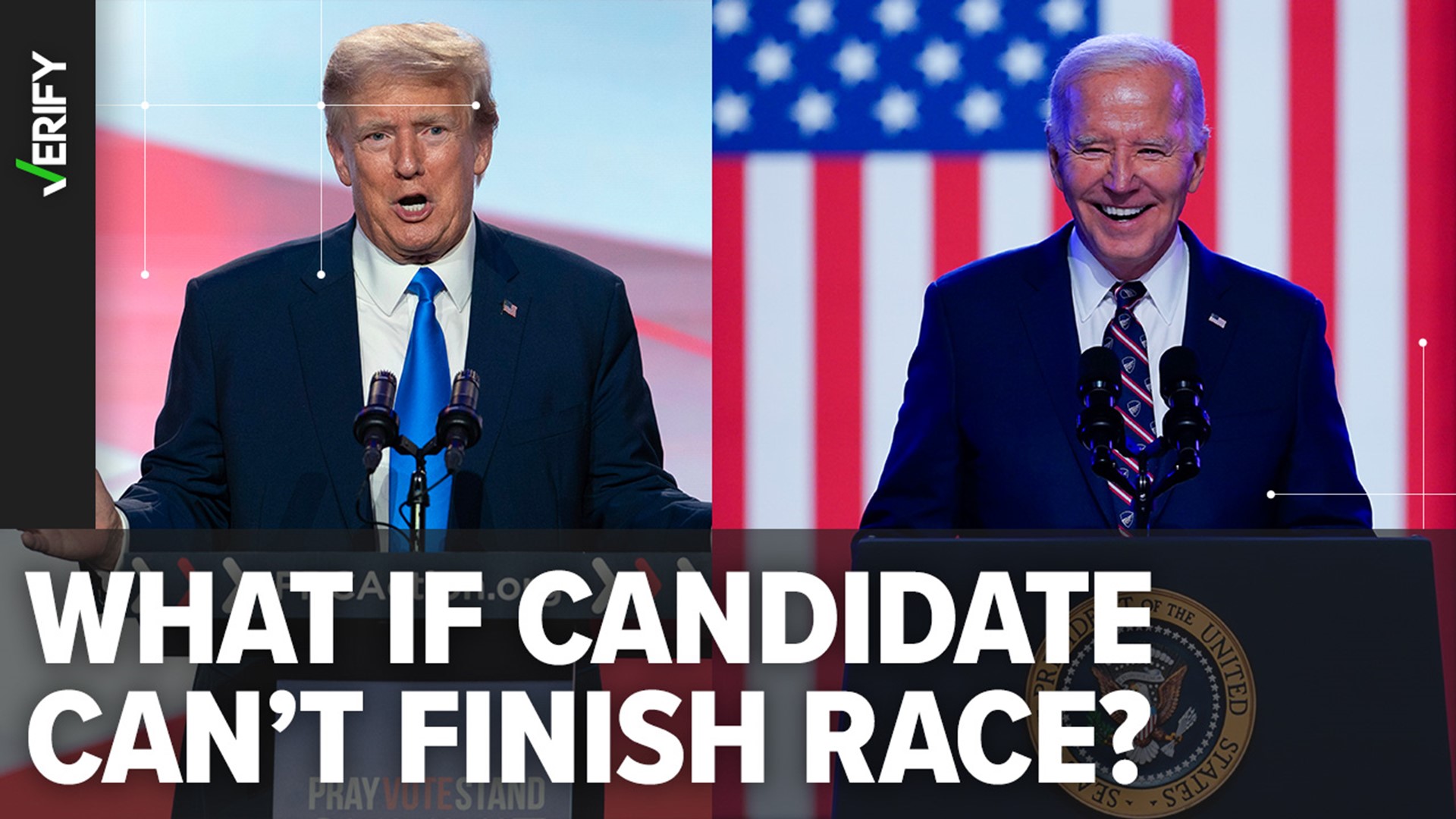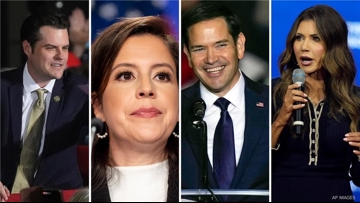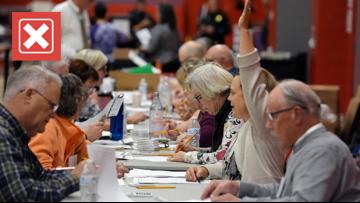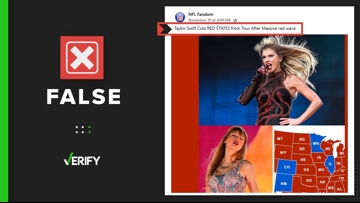The leading candidates from both major parties in the 2024 presidential election are old.
President Joe Biden is 81 and former President Donald Trump is 77; both have already exceeded average male life expectancy in America, 73.5 years. Polls show age is a major concern for voters.
Several VERIFY readers asked what would happen if either of these leading candidates were to drop out of the race for health reasons, or even die mid-campaign. Below, we break down the potential outcomes for such a scenario.
THE QUESTION
What happens if one of the leading presidential candidates dies or drops out of the race?
THE SOURCES
- Elaine Kamarck, senior fellow in governance studies at the Brookings Institution
- U.S. Constitution
- Republican Party, official rules
- Democratic Party, official rules
- Various state laws and party rules
THE ANSWER
The answer depends on several factors, including the timing of such an event within the election cycle, state laws, party rules, and the U.S. Constitution.
WHAT WE FOUND
If a presidential candidate dies or drops out during an election cycle, what happens next depends on timing. We break that down into five stages: during the primaries, at the conventions, after the conventions but before Election Day, after Election Day but before the Electoral College votes, and after the Electoral College votes until Inauguration Day.
During the primaries
If a candidate dies during the primary season, there are two scenarios to consider: the elections still coming up and the votes that have already been counted.
First, the majority of filing deadlines have already passed, meaning any changes to ballots, like removing a candidate, would likely require action from the state legislatures – or in some cases, state political parties – to extend the deadline or delay the vote.
That also means any newcomers who wish to enter the race would have to stage a write-in campaign in the states that allow it.
In some states, voters could also decide to select “uncommitted” on their ballots. If enough voters do so, some of the delegates from that state would go to the convention as free agents, not bound to vote for any particular candidate.
As for delegates already won by the candidate before their death or withdrawal from the race, their status would depend on state and national party rules. Many state parties have rules saying delegates for candidates no longer in the race become uncommitted free agents at the convention. Some have rules automatically re-assigning the delegates to other candidates depending on how they fared in the state’s primary. A few require delegates to cast their initial votes for candidates even if they are no longer in the race.
Neither Trump or Biden has already secured a majority of the total available delegates for their party’s nomination, meaning it is theoretically possible that if they died, another candidate could secure the nomination during the primaries. But as more primaries are completed and the number of delegates already won grows, it becomes increasingly unlikely that another candidate could amass enough delegates. And if no active candidate has a majority of delegates secured, the nominee will need to be decided at the convention.
At the convention
In the event the leading candidate has died or withdrawn, the national parties may decide to enact rules at their convention to assure any delegates bound to them at the state level are free to vote for someone else.
Elaine Kamarck, a senior fellow at the Brookings Institution who authored a book on the presidential nomination process, told VERIFY that based on the current bylaws, Republicans would probably have to pass a new rule to free up delegates, whereas Democrats could lean on existing language that says delegates should vote “in all good conscience” for the candidate they were assigned to – potentially leaving room for them to vote for someone else if that candidate is no longer an option.
Even if a deceased candidates’ delegates are freed, in the first round of voting, living candidates would keep their delegates.
But if no candidate has won a majority after the initial vote, the convention becomes “brokered” or “contested,” and all delegates become free agents.
At this point any candidate can vie for the delegates’ support, even if they didn’t run in the primary. Negotiations, persuasion, and dealmaking occur between subsequent rounds of voting until one person wins the majority of delegates and becomes the nominee.
"That used to happen all the time in the old days and old-fashioned conventions, but hasn't happened much lately,” said Kamarck.
A brokered convention hasn’t happened since primaries became the main way of assigning delegates in the 1970s.
After conventions, before Election Day
If Trump or Biden receives their party’s nomination but then dies or drops out before Election Day, a replacement would be selected by party leadership.
Both the Democratic and Republican parties have rules on the books stating explicitly that such a vacancy would be filled by a vote of the party’s national committee, made up of a few hundred state and local party leaders.
"The national committees are the party governance in between conventions, and so the national party chair in each party would call their party into a meeting, and they would have to sort out who they'd like to see as their nominee,” said Kamarck. "The national committeemen and national committeewomen, they are all elected in a process in their state.”
After Election Day, before Electoral College votes
If Trump or Biden wins the general election in November, there’s a monthlong window afterward in which their death could trigger some constitutional chaos.
In the United States, the president is formally decided by the Electoral College, in which real people called electors – picked by their state party – go to their state capital and file the official votes for the candidate who won the state.
There are 538 electoral votes allocated to each of the 50 states plus the District of Columbia, with each state and DC getting two electors automatically and the remainder being distributed proportionally by population. To win the presidency, a candidate needs a majority of electors to vote for them. In 48 states and DC, the winner of the state’s popular vote gets all the electors. In Maine and Nebraska, the statewide popular vote winner gets two electors, and the winner of the popular vote in each of the state’s congressional districts gets an elector.
But if the person who won the state were to die before these votes got filed, it’s an open legal question about who the electors are supposed to vote for.
Some states have laws mandating that electors vote for the state’s victor, or else have their vote voided or face criminal consequences. But only a few states included exceptions in the law for the death of that winner. Meanwhile, there’s some historic precedent to suggest electors are constitutionally bound to vote only for candidates eligible to take office.
This conflict means states with these “faithless elector” laws would likely have to call an emergency session of their state legislatures and amend the laws to clarify who electors are allowed to vote for.
"Odds are, the easiest thing to do would be [for electors to] vote for the vice presidential candidate on the ticket [of the candidate] who won,” said Kamarck. “But you could see that there's maybe a little room for some funny business."
After Electoral College votes, before Inauguration Day
Things get a lot simpler if the president-elect dies before they can take office, but after the Electoral College votes.
In this situation, the 20th Amendment to the Constitution is invoked.
It states that if the president-elect dies before getting sworn in, “the vice-president-elect shall become president.”
Afterwards, the new president would nominate a new vice president, who would have to be confirmed by the Senate.
This story is also available in Spanish / Lee este artículo también en español: Verificamos lo que sucedería si Trump o Biden fallecen o se retiran de la contienda electoral












